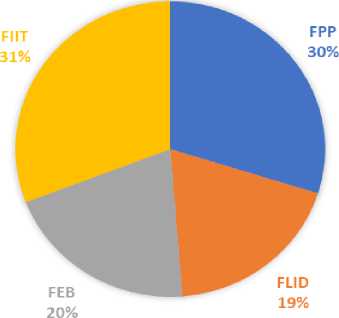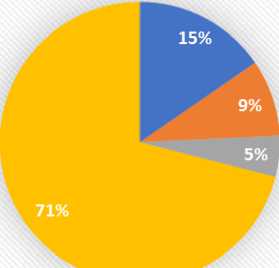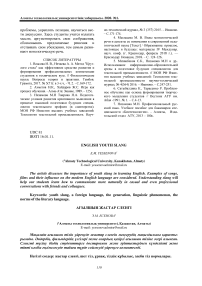English youth slang
Автор: Yessenova E.M.
Журнал: Вестник Алматинского технологического университета @vestnik-atu
Рубрика: Инновации в образовании
Статья в выпуске: 1 (126), 2020 года.
Бесплатный доступ
The article discusses the importance of youth slang in learning English. Examples of songs, films and their influence on the modern English language are considered. Understanding slang will help our students learn how to communicate more naturally in casual and even professional conversations with friends and colleagues.
Youth slang, foreign language, generation, linguistic phenomenon, norms of the literary language
Короткий адрес: https://sciup.org/140250849
IDR: 140250849 | УДК: 81
Текст научной статьи English youth slang
Nowadays, the English language occupies a significant place in modern life.
Today, there are a huge number of techniques and principles for its study. All of them are incredibly diverse and unique. But no matter how well you know “classical” English, in modern society you also need to be proficient in the language of youth, that is, to know youth slang. And it is problematic, because at schools, universities and even special courses this is not paid due attention. The teaching of slang is not an easy process, because English, like any other language, is constantly evolving. How people said 10 years ago has long been forgotten, and those phrases that are used now, it is unlikely to be relevant in the next 10 years.
Nevertheless, slang is needed and important, just to understand it. After all, often native English speakers use slang, thus not understandable to those who have studied only the traditional foreign language. The same problem pursues us when we watch foreign films and listen to foreign music. They are simply imbued with various kinds of slang, and often they are the cause of formation them.
Objects and methods of research
The object of research in this article is the existence of youth slang in the modern English language. In the course of the study there were used such general scientific methods as the analysis of literature on educational technologies in teaching a foreign language, generalization of lexical material in English, comparison of terminological features of different language genres, experiment, observation .
Results and their discussion
Youth slang –social dialect people aged 1222 years, arising from the opposition of themselves not so much to the older generation, as the official system. It is a crucial part of a young person’s “coming of age”, one of the first detectable signs of their breaking away from their parents and their parents’ values. It is a cheap second language that expresses the differences between a young person who is about to enter adulthood from his or her parents’ generation.
Slang comes from high schools and colleges but it isn’t limited to those places. And slang is associated with youth; the older we get, the less likely we are to maintain it So slang is not a language, dialect, or ordinary register. It is a special code that differentiates those who are ‘with it’, who ‘make the scene’ [2].
Every generation has/had its own slang terms that evolved as a result of their culture. We’re all basically the same in our teens just with different trends and funky new words to differentiate ourselves from the previous generation.
Slang is unavoidable, no matter what language you’re speaking. The phrase “worst movie ever” may not show up on BBC’s website anytime soon, but you’ll see constructions like these daily on Facebook and blogs. What’s more, communication mediums such as texting and Twitter are moving so far from formal language that even native speakers can have trouble figuring out messages like “word” and “big up.” Slang generally evolves from the pop culture of that decade and speaks to the youth in that particular decade.
Let’s take a language student, attending daily classes. They study the grammar, the formalities, the subtle differences between look at and watch. They might produce lovely coherent sentences and conversations. Take this student out of the classroom and away from the textbooks, though, and they will encounter a world of language that breaks those rules. In advertising, online, and in conversation, language becomes far less structured. Taking the time to understand slang and informal speech might save someone a whole lot of confusion. In understanding and in speaking, it will allow that student to use language in a current way.
It is known that in our day pop industry popular with young people. Thus, many of the phrases and words of popular music and movies are used in their speech.
For example:
-
1) Bae, babe(baby)- a typical slang appeal to best friends, the loved person, etc. The meaning of the words bae , babe similar to honey, sweetie.
Come get it bae… (from Pharrell Williams - Come Get It Bae) – baby ,come on faster.
-
2) Catch feels - to fall in love (literal translation - to catch sensations).The fact is that the word “ fall in love” in this formulation was not used until Calvinsongs Harris – Feels ft . Farrell Williams, Katy Perry, Big Sean and it also makes the phrase “catch feels "slang.
-
3) S wish. In general, the
word swish means the exact hit in the basket, but after the release of the song Katy Perry -Swish Swish is a word used when they want to show their superiority over someone.
-
4) Look what you made me do- look at what you brought me to.
Phrase to make somebody to do something means forcing someone to do something
In general, the phrase " Look what you made me do "became slang thanks to the song Taylor –“ Look what you made me do”, which became a hit.
-
6 ) Swalla . From song of Jason Derulo – Swalla. ‘Swalla’ from English swallow It is something like a short form of this word.
-
7) Before cool done run out I’ll be giving it my bestest
... ( from Alexander Rybak - I'm Yours )
... as long as I have a supply of selfcontrol
I will do everything in my power ...
Bestest - the best of the best . English slang, formed by the complexity of the original word.
-
8) It might seem like a crush But it doesn’t mean that I’m serious (from Britney Spears -Oops! ... I Did It Again)
It may have a strong falling in love, but this doesn’t mean that everything is serious
Crush - literally translated as crush or destroy The youth English describes the object mad love speaking. Also crush can mean wanting to be with a loved one.
-
9) ... I didn’t tell you what I was a savage , But you never could imagine
Never told you could have it ... (from Rihanna Needed Me )
... Didn't they warn you that I was “merciless”?
I bet you couldn't imagine
What so never get me?
Savage generally means savage, barbarian, and in slang English describes events or a person as something brutal, cool. This word is often used as a hyperbole, which is inherent in slang.
-
10) The Show Must Go On – ‘Queen’
Show must go on
Perhaps the most honest song here and it must be on this list. This song itself is slang, despite the fact that it came out a long time ago.[3]
Slang in the series "Game of Thrones" (" Game of thrones ”)
The game "Game of Thrones" takes place in fictional world resembling medieval Europe. In the series at the same time operates many characters and develops somewhat plot lines. Main plot arches three: the first is devoted to the struggle of several influential houses for the Iron Throne With his kingdom or independence from him; the second - a descendant of the ousted dynasty of rulers, the exiled princess, who plans to regain the throne; the third - to the ancient brotherhood protecting the state from threats from the north.
Slang was not used as such in the series itself; on the contrary, it became the progenitor of new slangs, which the young population immediately picked up.
-
1) “You know nothing , Jon Snow "-" You do not know anything, John Snow
This phrase here said another heroine. She repeated it repeatedly and therefore she was remembered by the audience. Over time, the phrase turned into slang. And as slang is used very simply, when people say: “you know nothing”, “John Snow” is involuntarily added.
-
2) “Winter is coming” - “Winter close."
Winter is near (Winter is coming ) - the motto of the House of Starks from the series "Game of Thrones". Used for winter preparations jokes - buying wool underwear, felt boots, installing winter tires. “Close” can be not only winter, but also a session, a salary, whatever.
(something) is coming - approximation of something. This phrase became the game of thrones. There was said - winter is coming. This is a phrase that remembered among people.
Not all slang expressions disappear out of the language after they've served their purpose, or as the generation who used them assumes adulthood. In fact, the expression can become so absorbed into the English language that it's no longer mere slang, but a mainstream expression.
For example, the phrase "hung out," or "hang out." The phrase is commonly used today, and not just in casual settings. It's become so inculcated into our culture that one can use it, even in an executive board room, and no eyebrows will be raised in response. So what's the source of "hang out"? Although there's evidence that the term was used as early as the 1830s to mean "loiter or idle about," the current use of the phrase probably has a more recent incarnation. In this context, the phrase comes probably is a derivative of speech peculiar to the 1960s hippie generation. These were teenagers and young adults who rejected and in language.
The point of much of their success was apparently how annoyed or upset adults would become by the behavior. They were easily upset by how slang affects the English language they used, and they wanted their kids to conform to social norms.
The current phrase, "hang out," is probably derived from the hippies of several generations ago.
"Cool" is another expression that had its modern day beginnings with the 1960s hippies generation; but, it probably goes back at least to the 1920s with the arrival of the jazz age. In the Flapper Era, jazz music was considered to be extremely cutting edge, and jazz musicians had their own modes and means of living.
Some of that rubbed off on the Charleston dancers and the patrons of the speakeasy (another slang word for a bar with alcoholic beverages back when Prohibition made serving liquor illegal.)
Jazz was "cool," as in sophisticated. The latter day hippies use of it meant that the object of coolness was singular and unique, a twist on the Jazz Age use of the word.
We conducted a small survey among students of 1,2 courses of Almaty technological University on the use of English slang. Students of 4 faculties were interviewed. Here the results:
DO YOU USE ENGLISH SLANG?

Figura1 - Using slang among students of 4 faculties
They use such words as:
|
Cool |
To much |
|
LOL |
Spoiler |
|
Check |
Friendzone |
|
BRO |
Flex |
|
Baby |
As always |
|
Trash |
Cops |
|
Easy |
Fake |
|
Selfie |
Oops |
|
Repost |
Looser |
WHERE DO YOU USE ENGLISH SLANG?
■ at home ■ at university ■ in public places ■ internet
Figura 2 - Places of using slang
How do you know about slang?

■ Friends ■ Social networking ■ online games ■ different sources
Figura 3- Source of slang
As we see from Fig. 1 the students faculty FIIT use English slang more often than others. It may be because of their work is connected with computers and social networks.
Fig.2 shows us that young people use these words mostly in internet in networking sites.
And from Fig.3 we understand that slang may come from different sources.
Conclusions
Thus slang is a complex and inevitable language phenomenon. The concept of slang is very multifaceted. With the development of mass media, the concept of slang has lost its original meaning, but it was as follows: slang is words that live in a modern language with a full life, but are considered undesirable to use in a literary language. Not a consensus on youth slang.
Words and expressions are simplified, shortened, they come up with other names. Perhaps, therefore, slang and slang expressions have received in our time such an advantage. Because of its accuracy, brevity and pithiness, it becomes more preferable in conversation. It is very difficult to discard or ignore any slang expression, if it reflects the idea, the thought, the state at the time of speech as completely and accurately as possible [3-4].
Also it was observed how much the techniques influences on contemporary culture and vice versa as pop music and movies affect today's English, changing it. Time will tell whether this is good or bad, but for now we should just accept it as a fact. It’s important for ESL students to become familiar with English slang. Teaching these common, everyday words and phrases used in informal, spoken English can help students speak improve their fluency and improve their conversational skills.
Understanding slang will help our students learn how to communicate more naturally . By teaching our students just a few slang words, you’re helping them learn how to speak English naturally as they hold casual conversations with friends and colleagues.
Список литературы English youth slang
- Марушкина Н.С., Неупокоева В.Ю. Молодежный сленг как языковое явление // Молодой ученый.-2015.-№ 23 (103). - С.103-105.
- Велим, Е.С. Употребление молодежного сленга в современном дискурсе // Вестник ТвГУ. Серия: Филология (1). 2014. - С. 162-165.
- Baoan, W. Application of popular English songs in EFL classroom teaching. // Humanizing Language Teaching, 2008. - Рр. 286-292.
- Dörnyei, Z. Motivation in second and foreign language learning. Language Teaching, 2008. - Р. 117-135.


